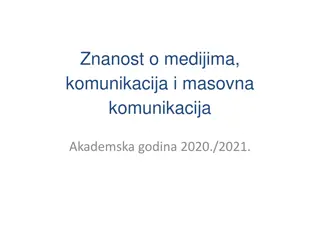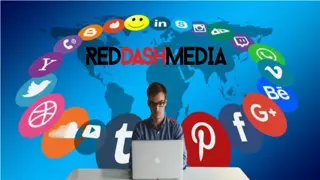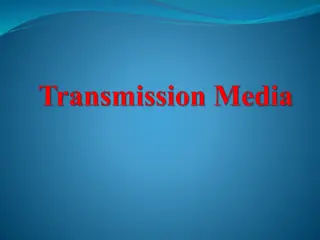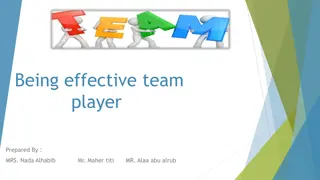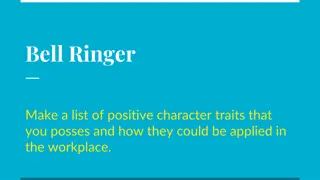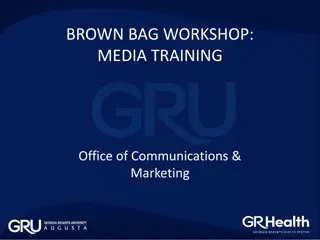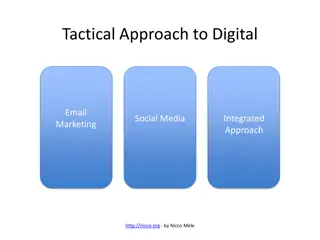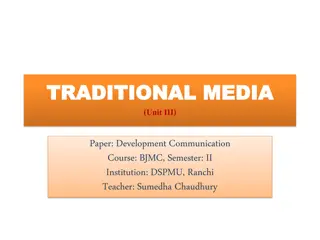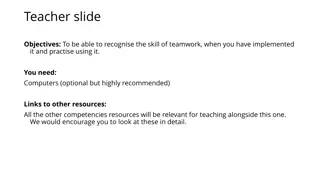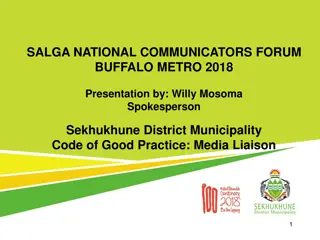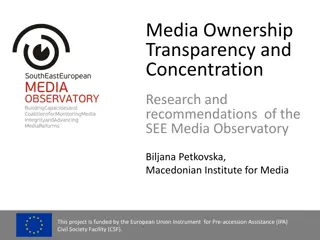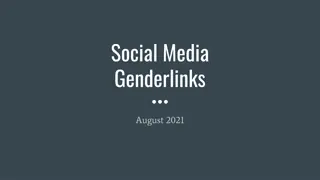Understanding Teamwork in Communication and Digital Media
Explore the definition and principles of teamwork, reasons for choosing teamwork, Tuckman's model of teamwork stages, team member roles, communication strategies, team management, specialized vocabulary, and more. Delve into the forming and developing of teams, phases like forming, storming, norming, and performing, and the importance of collaboration in achieving shared goals.
Download Presentation

Please find below an Image/Link to download the presentation.
The content on the website is provided AS IS for your information and personal use only. It may not be sold, licensed, or shared on other websites without obtaining consent from the author. Download presentation by click this link. If you encounter any issues during the download, it is possible that the publisher has removed the file from their server.
E N D
Presentation Transcript
English Terminology II Communication & Digital Media Teamwork Spring semester V. Chatzipanagiotidis
Outline A definition of teamwork and its underlying principles Reasons for choosing teamwork Tuckman s model of Teamwork and its stages The different roles members can play in a team Suggested strategies for team communication Team management Specialized vocabulary and lexical practice 2
Warm up Which of the following qualities you think one needs to be an effective team member? 1. Aggression 7. Confidence 2. Friendliness 8. Education 3. Co-operation 9. Good-looks 4. Punctuality 10.Politeness 5. Patience 6. Incompetence 3
Preferences and reasons for teamwork Teamwork: the latest management obsession Teamwork: Two heads are better than one , a saying acknowledged by companies Why is teamwork preferred? 1. Higher quality of work 2. Better products 3. Increased overall productivity 4. Efficient solutions to problems 5. Job satisfaction for employees 4
Definitions Team: a group that has at least three and no more than 12 or 15 members brought together to complete specific tasks Characteristics of a team: 1. Share common goals 2. Work together to achieve them 3. Stay together for a period of time (short / long) 4. Deal with one problem/ task as it arises 5
Forming and developing teams It requires a lot of hard work and skills Why? -> we blend different personalities, abilities, temperaments into a cohesive group Tuckman s model for developing teams There are certain phases until the members develop norms and roles Forming Storming Norming performing Adjourning 6
The forming and storming phase In the forming, - - conflict is avoided - - the members come together, discuss their goal politely - - become familiar with the task In the storming, - the honeymoon period is over. - There is competition: they realize that they disagree on certain issues - some express their preference for independent work. 7
The norming and performing phase In the norming, - Members talk about their disagreements - They understand that they can work together In the performing phase, - Members are ready to perform - They accept each other s ideas and work together with loyalty 8
The last phase Adjourning, - The task and the team members relationships are terminated 9
Strategies for effective team communication 10
Strategies Members should share Responsibilities and results Support team spirit Trust and tolerance Courtesy and loyalty Think what they can do to help partners 11
Issues and how to resolve them Schedule a private meeting or a reply with equal honesty Impersonal statements should be employed (Avoid derogatory personal statements) The way something is said influences / helps team work Acknowledge and reward the contribution of others Do not hesitate to ask for help Help your partners to become successful and achieve the goals Listen the other member s views (thus, promoting interaction) 12
Information-seeker: ask for more data Different roles among team members Opinion-giver: state the views and beliefs Energizer: stimulates the group to set higher goals Recorder: keeps a record of teams ideas and actions Dominator: control over the team 13
Initiator: proposes solutions and new ideas Different roles among team members Time-keeper: no time is to be wasted Mediator: help work out conflicts Information-giver: offer info and facts to the group Evaluator: the actions and decisions against objective standards 14
Match the roles with the following sayings. Evaluator Initiator Opinion-giver Information-seeker Information-giver I have some new ideas that may help us. What must we do? I know lots of things that will help us and fortunately, I ve read many articles on this issue. I believe that we must start by analyzing statistics, because this is the best way to achieve our goal. If our goal is to do a good job, we must spend at least two weeks reading articles and statistics. 15
Match the roles with the following sayings. Recorder Mediator Dominator Time-keeper Energizer I don t think that what you plan to do is enough. We must do more. We must write down everything we say, so that we will be able to review ideas. There is no reason to argue. All the ideas are good and we can combine them. It s 3.30 and we have only 30 minutes left. If you don t do what I say, we will definitely fail. 16
A. Matching the two halves. Certain phases In business world, teamwork Results and responsibilities Team formation involves Does not imply weakness Teamwork is considered to May destroy the friendly climate In the storming phase team members Team members should share Has become an obsession Derogatory statements Are more competitive than co-operative Asking for opinions Increase overall productivity 18
B. The Communication Quiz C .. O M . M . U . N .. I .. C . A .. T I .. O N Another word for disagreement Sometimes it becomes a mania Equally shared The opposite of minority Another word for sympathetic The name of the 3rd team forming phase To become larger Another word for consistency To admit, to recognize This unit s title Not personal Include everything Another word for regulation 19
C. Rewrite with their opposites If you don t want to be an ineffective team member, try to show tolerance, loyalty, politeness and trust to the other members you work with. Never employ derogatory or personal comments when arguing, because being unpopular may affect your performance. If you are reluctant to work for the common goals, the other members will disrespect and punish you. eg. If you want to be an , don t show . 20
Thank you for your attention! Are there any questions? 21




